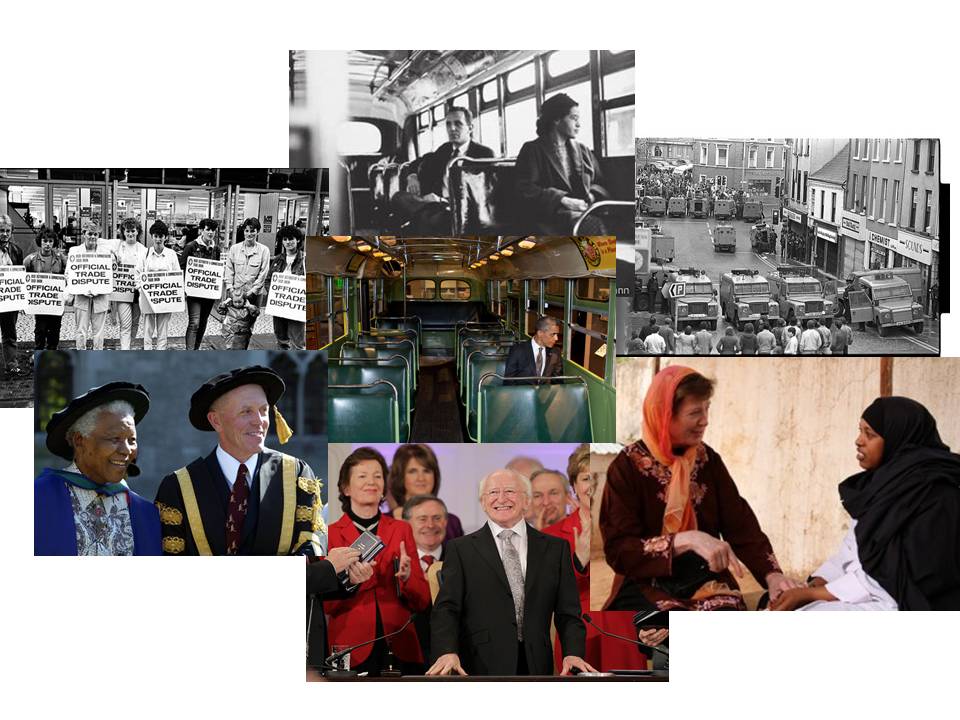 History has much to teach us about change. Time and again, social changes which begin with seemingly improbable goals bring about new realities, becoming the fabric of our lives. We each will have personal examples of this. From my childhood in New York City to my nearly 20 years living in the west of Ireland, examples abound. The remarkable becomes the accepted. Looking back from our current vantage point, many major social changes seem as if they were inevitable.
History has much to teach us about change. Time and again, social changes which begin with seemingly improbable goals bring about new realities, becoming the fabric of our lives. We each will have personal examples of this. From my childhood in New York City to my nearly 20 years living in the west of Ireland, examples abound. The remarkable becomes the accepted. Looking back from our current vantage point, many major social changes seem as if they were inevitable.
Today we are living through a time of enormous change in education. The pace of developments in open online education, in particular, has been dizzying: OER, Open Courseware, iTunesU, the Khan Academy, connnectivist MOOCs, institutional MOOCs, open badges. In the past seven months alone, we’ve seen the launch of Udacity, Coursera, MITx, EDx and TEDEd. What might higher education look like in 10, 20 or 30 years? Will our universities look the same, serve the same purposes? In all likelihood, they will not. And when we assess our education institutions at that future point, will we say: “Of course. Given the changes occurring in technology and society, the change was inevitable.”
I was asked to give one of the keynotes at the recent Galway Symposium on Higher Education (described in a previous post). The theme of the symposium, “The Written Word”, gave much scope for participants to consider not just writing but learning, teaching, literacies, assessment, openness and creativity. I welcomed the opportunity to focus on change, particularly recent developments in open education, and to consider re-imagining the future of higher education.
[slideshare id=13245125&style=border: 1px solid #CCC; border-width: 1px 1px 0; margin-bottom: 5px;&sc=no]As with social change, our voice — our vote — in education is essential to creating the future. My heart sinks when I hear wonderful educators say, “I don’t know anything about/I don’t have time for… [fill in the blank: Twitter, blogging, even social bookmarking, etc.]”. I know that this means that their voices will likely not be part of educational futures which are being shaped now.
It’s not about age or the hopefully-dead Digital Natives/Digital Immigrants argument. (And anyway, why would it be about age, when our students are of all ages? As educators we surely are seeking to engage and include all of our students.) And it’s not about using this tool or that, or being for or against using a VLE. I think that the future is being shaped by educators who are open to change, open to continuing to learn, and open to learning from failure. These are the educators who inspire both their peers and their students.
In January 2012 Michael D. Higgins, Uachtarán na hÉireann (President of Ireland), received an Honourary Doctorate of Laws from the National University of Ireland. In his speech at that occasion he spoke of the role of the university in moving boldly into the future:
“The university is, and remains I suggest, a space from which new futures have always emerged and must do so again. The ethos of independent scholarship is what delivers a previous scholarship’s achievements into the present and challenges that scholarship for renewal and replacement… To navigate successfully through today’s troubled, uncertain, and probably uncharted, waters, now, more than ever before, we need vision, foresight and bold strategies. Now, more than ever, an original and confident education system is needed…”
We must be willing to ask the difficult questions. In moves toward open education, many long-held practices are being re-evaluated: open publishing questions (blind) peer review; the use of social media questions the “walled gardens” of classrooms and VLEs; pedagogical research questions the effectiveness of lecture as a teaching method, new educational initiatives outside higher education will continue to question the cost/benefit ratio of university degrees. What are your opinions? Which new practices are worth developing? Which current practices still hold value? Which practices do we wish to hold onto, and which should be left behind? Only those willing to engage with these new technologies and new practices will be in a position to evaluate them, and to make decisions which shape the future of education.
CC and publicly available images:
Rosa Parks, donated by Corbis-Bettmann, Shavar Ross (Flickr); President Barack Obama on Rosa Parks bus, The White House (Flickr); Presidential Inauguration, Michael D. Higgins, Irish Defence Forces (Flickr); Separate factions on Irish Street, Downpatrick, Burns Library, Boston College (Flickr); Mary Robinson and Nadhifa Ibrahim Mohamed in Somalia, Trocaire (Flickr); Dunnes Stores strikers, Trocaire (Flickr) – used with permission; NUI Galway, Nelson Mandela visit, 20 June 2003
One thought on “Change, (Higher) Education, and Us”